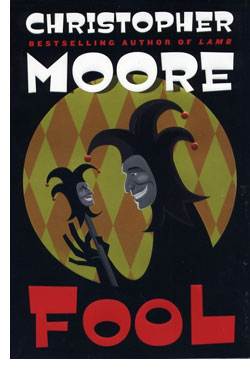 |
 Christopher More
Christopher More
Fool
Reviewed by: Rick Kleffel © 2009
William Morrow / HarperCollins
US hardcover first Edition
ISBN 978-0-060-59031-4
Publication Date: 02-10-2009
336 Pages; $26.99
Date Reviewed: 03-20-09
Index: Fantasy
General-Fiction
Check your preconceptions at the door; Christopher Moore may not have been an English Major, but he could certainly put most of those who were to shame, though he's a lot more likely to make them laugh. Moore's latest novel, 'Fool' is nothing less than the story of King Lear, as told from the fool's perspective. In point of fact, it is much, much more, a comedic mash-up of British history, Shakespeare, every form of written humor you can imagine and a few that Moore himself invents just for this novel. All of this might be great but still fall flat were it not for Moore's gift of investing even the silliest of novels with genuine emotion that allows readers to connect with the characters and the laughs to last.
Don’t let unpleasant memories of high school or college English courses daunt you from opening the book in the first place. In seconds, Moore establishes a kooky comedic tone that he sustains for the rest of the novel. It's as if the author is telling us there's nothing to be afraid of; he warms up the audience with few easy laughs. From the beginning, 'Fool' offers the first-person narrative of Pocket, a diminutive Jester with grand plans and even grander appetites. I'll save the plot summary for the Cliff notes, but it's important to note that Moore sets several real plots in motion that keep the pages turning briskly until you find yourself reading the author's note ("You Cheeky Git"). Shakespeare provides the scaffolding for Moore's plot, but 'Fool' offers both new perspectives and new plot twists to keep the reader riveted.
But the plot isn’t limited to the action. Part of the joy — and to my mind, the plot — of 'Fool' is Moore's ability to pack his novel with references to literally thousands of sources beyond 'Lear.' You'll get more Shakespeare than a graduate course with a focus on the Bard, but a lot more enjoyable. Moore references other writers and lots of English history as well. He riffs on the history of British humor, and takes jabs at political targets in the present. Every page seems to reveal a new source of input or inspiration; 'Fool' is the kind of book you could read a few times with your notebook and a good search engine to hand in order to pin down Moore's ever-shifting flow of inspiration.
In general, this reader is quite dubious of American writers who try out the written version of a faux-British accent. I don’t like it and it usually falls flat. Moore cleverly avoids this with a prose style that offers the dramatic and poetic feel of Shakespeare, even though it's a true post-modern 21st-century mash-up/remix. Moore aims for and achieves a dense, joke-laden mix that allows him put in pretty much anything he wants so long as it's funny. Moore's become quite skilled at "funny," with the result that 'Fool' is thoroughly entertaining on a linguistic level.
All of Moore's remix skills would be for nought if he didn't connect with the reader on an emotional level. And he's treading in dangerous territory, because frankly, the narrator, Pocket, is something of a rapscallion. He'll bang anything that sits still long enough, and he delights in skewering and screwing most of those around him. But he retains a core of goodness, in his loyalty to Drool, his huge, slobbering assistant and his attempts to make things right for the increasingly annoying Lear. On the other side of the equation, Moore makes despicable characters that are still enjoyable to read about. I particularly liked Oswald, who combines the worst aspects of a toady and a villain. The bastard Prince Edmund is in Moore's novel an over-the-top evil sub-genius, prone to soliloquies that might not sound out of place in a Shakespearean chat room on the Internet. Frothing should always be this fun.
Moore achieves something rather unique in 'Fool,' combining sublime silliness with significant scholarship. The results are consistently entertaining. 'Fool' fires off with a cast of characters, and those of us who haven't written an essay on 'Lear' in the past couple of years are going to need it. On the stage it's easier to keep track of the who-is-who in the large cast than it is on the printed page. Moore makes the ultimately wise but potentially confusing decision to stick with Shakespeare's overly-complex plot arc. But by the time this becomes apparent, he's earned the readers' good Will, and we follow him merrily, if occasionally scratching our heads as we try to connect A to Z. Ultimately, 'Fool' is the kind of novel that's a delight in the moment, and yet even as you're laughing, you can understand that a rather lucky group of grad students some years hence will manage to pull a thesis or two out of the work. Readers in the present have the unique joy of laughing at and with those who will follow.
|
 |
